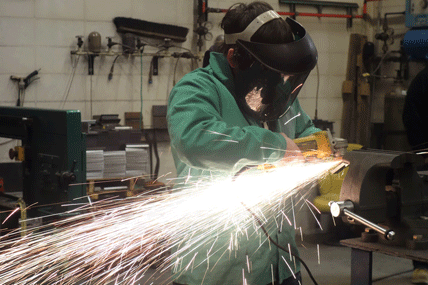In May, Spoon River College officials learned that the college would be receiving $1.5M in CARES Act Recovery Assistance to boost its workforce development programs. That boost will be in the form of new training equipment and renovations of the college’s Vocational and Technical Education Center (VOTECH) over the next three years.
Advanced Manufacturing, Agriculture, Commercial Driver Training (CDT), and Diesel and Power Systems Technology (DPST) programs are among those slated for the updates.
“Almost all local, regional, and national skilled trades are suffering from a skills gap in the talent pipeline. The jobs are there, but the skilled workforce is not,” said Brad O’Brien, dean of career and workforce education at Spoon River College.
O’Brien noted that it is predicted there will be three million job openings in the US in skilled trades by 2028. “Our goal is to provide training with more technologically updated equipment in order to close the gap, feed that talent pipeline, and give our students the skills that will lead to them being successful.”
Students in the Ag program will benefit from a new tractor with auto steer capability, allowing expansion of the existing precision technology program. “These tractors have become a staple in the agricultural world and provide multiple benefits to farmers working their fields, including taking the human error out of the equation,” O’Brien said.
Truck driving continues to be a high demand career, and the current fleet of tractors and trailers in the CDT program will be replaced over time with more modern equipment. “The demand for truck drivers is only going to increase, and it’s also a high wage earner. We’ll be able to give our students an updated look into the future of the field of truck driving,” said O’Brien.
As with Ag and CDT, the Diesel and Power Systems Technology program will also become more modernized. The grant will provide more technologically modern diesel engines for training purposes, allowing students to learn diagnostics and trouble-shooting on a higher level.
“The updated engines, with their functioning diesel emissions after-treatment components, will give students an enhanced hands-on training experience, as will use of diagnostic software,” said Joe Clemens, DPST instructor. “There could also be the possibility of being able to offer additional training certificates to our students, making them even more preferred by employers and capable of filling the numerous job opportunities that are available.”
New welding booths and manufacturing/robotics training simulators will be purchased for the Advanced Manufacturing program to expand the current program as well as contribute to the development of newer areas within manufacturing.
The VOTECH building itself will also receive an upgrade with new ventilation and exhaust systems plus an overhead crane in the shop area, geothermal in the offices and classrooms, radiant heat, new overhead doors, LED lights, a new air compressor and large fans. A Mezzanine will also be constructed in the diesel tool area.
These career training programs can be completed in two years or less.
O’Brien said that college officials regularly meet with local and regional workforce representatives. “We have to stay current on industry needs and modern technology as we prepare students for the jobs that are available now, as well as for future jobs that don’t even exist yet.”
“While other sectors have struggled during the pandemic, the skilled trades have remained strong throughout and are expected to do so post-pandemic. The workforce shortage they are experiencing had begun before the pandemic as the number of new workers lagged behind the number of those retiring. The jobs will be there, and skilled workers will be needed,” said O’Brien.


